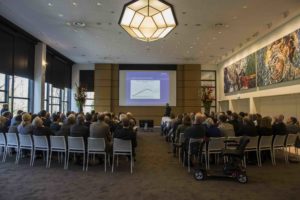 The symposium ’25 years ban on asbestos’ organized by the Dutch organization of IAS (Instituut Asbest Slachtoffers) in The Hague yesterday, called for the abolition of the expiration period of 30 years for victims of asbestos-related diseases to be considered for damages.
The symposium ’25 years ban on asbestos’ organized by the Dutch organization of IAS (Instituut Asbest Slachtoffers) in The Hague yesterday, called for the abolition of the expiration period of 30 years for victims of asbestos-related diseases to be considered for damages.
Chairman of the Board Rob van der Heijden called on all parties concerned, such as employers and insurance companies, to end the problem of expiration with regards to future claims. The expiration period of 30 years does not match the ever increasing period of latency that is seen in asbestos-related diseases.
Besides two panel discussions, demographics on asbestos-related diseases and an award ceremony, the three testimonials of men who suffer from asbestos-related diseases – one was diagnosed 50 years after having been exposed to the material – were for many attendees the most impressive part of the day.
Moreover, IAS presented the so-called ‘Asbestregister’, a register in which everyone who has ever been in touch with asbestos can make their own online file.
The aim is to simplify the burden of proof of exposure to asbestos in case he or she may unexpectedly suffer from an asbestos-related disease in the future.
The symposium was concluded with the Job de Ruiter Award ceremony. The trophy, that is awarded bi-annually to someone who has contributed largely to the well-being of asbestos victims, symbolises ‘man being supported by others’ and was created by famous Dutch sculptor Kees Verkade. Leon Widdershoven, Chairman of Asbestslachtoffers Vereniging Nederland, won the prize and was honoured by his predecessor, pulmonologist Sjaak Burgers, in a video message.
Read a full report on the Symposium in Dutch here.
Photos: Susanne van Vliet

